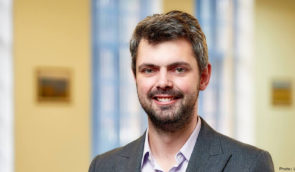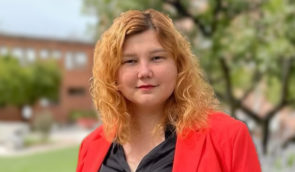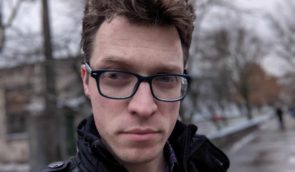Never Again?
“Price of a Jew in occupied Kiev: two loafs of bread, 50 marks and a pint of oil,” recalls Olexander Sklyarovsky who survived the Nazi occupation of Kyiv during World War II. The room is silent. The old man speaks about the forgotten in a quiet and humble voice, nothing pompous. At the memorial dinner “Six million hearts” dedicated to the International Holocaust Remembrance Day, his words touch the depths of the soul.
“The scariest is to go through the pain and fear as children and, at the end of our lives, to see it being repeated.” Sklyarovsky refers to the pain of Mariupol, Volnovakha, Donetsk, and Ukraine’s pain in general.
The room sends Sklyarovsky off with applause, no ovation, just a tribute.
Today the world is celebrating International Holocaust Remembrance Day. On January 27, 1945, soldiers of the 1st Ukrainian Front opened the gates of Auschwitz concentration camp located near the town of Oswiecim in Poland. Thousands of prisoners were freed from the death camp. This day was declared International Holocaust Remembrance Day by the UN General Assembly.
The evening has begun. The music is, at the same time, a prayer for the dead. One old man of small stature does not want to break the music of silence. He is sitting respectfully at the edge of the crowd listening attentively.
I look deeply into the faces of the guests, not those on an official visit in expensive suits and dresses, but into the eyes of the old men and women. Many of them are well over seventy. Their childhood began with pain and the hatred of some people towards others, simply for not being born of a “right” ethnicity, but as a Jew, a Roma, a Ukrainian, a Pole…
They were destroyed, burnt to the ground (“Holocaust” literally translates as “burnt” from Greek). Not only the “official” six million who were killed in the concentration camps, but the future generations that could never be…
“I was lucky to have been born,” says one of the guests whose family went through the ghetto.
These people are now having old wounds reopened. The war is not just in the East of Ukraine – it reverberates in every heart. Do they fear for themselves? I notice glances towards their younger companions (grandchildren perhaps?).
Attending ambassadors and other official representatives from different countries speak a lot about the events in Eastern Ukraine in their commemoratory speeches. It makes the heart ache as one guest says: “Who would have thought that the descendants of those who, seventy years ago, saved thousands of people from death camps would be fighting on the opposite sides of the barricades?”
“The violence that we see obliges us to prevent further violence. Despite the accusations of racial hatred and xenophobia, Ukraine is a multicultural country and will not accept it. We must say ‘Stop’ to violence!” proclaims Rovshan Tagiyev, the President of the Assembly of Nationalities of Ukraine.
Information war, hate speech, xenophobia, hatred, Babi Yar, ideology, fascism – these words are often heard in official speeches.
As of me, I am trying to hear more from them – the living witnesses of pain, of hatred of one nation towards another, living witnesses of human kindness and forgiveness. There aren’t very many of them left.
Today the international community says “Never again” in every language. I would like each of the delegates, who are now participating in grand ceremonies in Poland, to realize the sincerity and the pain behind those words and to do everything possible on an official level to stop the violence in Eastern Ukraine.
I would like every member of the Ukrainian government who utters these words during today’s solemn ceremonies to take steps towards joining the International Criminal Court by ratifying the Rome Statute. This would bring justice to crimes against humanity.
I would like every teacher, in the East of Ukraine and in the West, in the South and the North, in Crimea and in the center of our country, to use these words in teaching their students respect for human rights. Then we could truly say “Never Again.”














